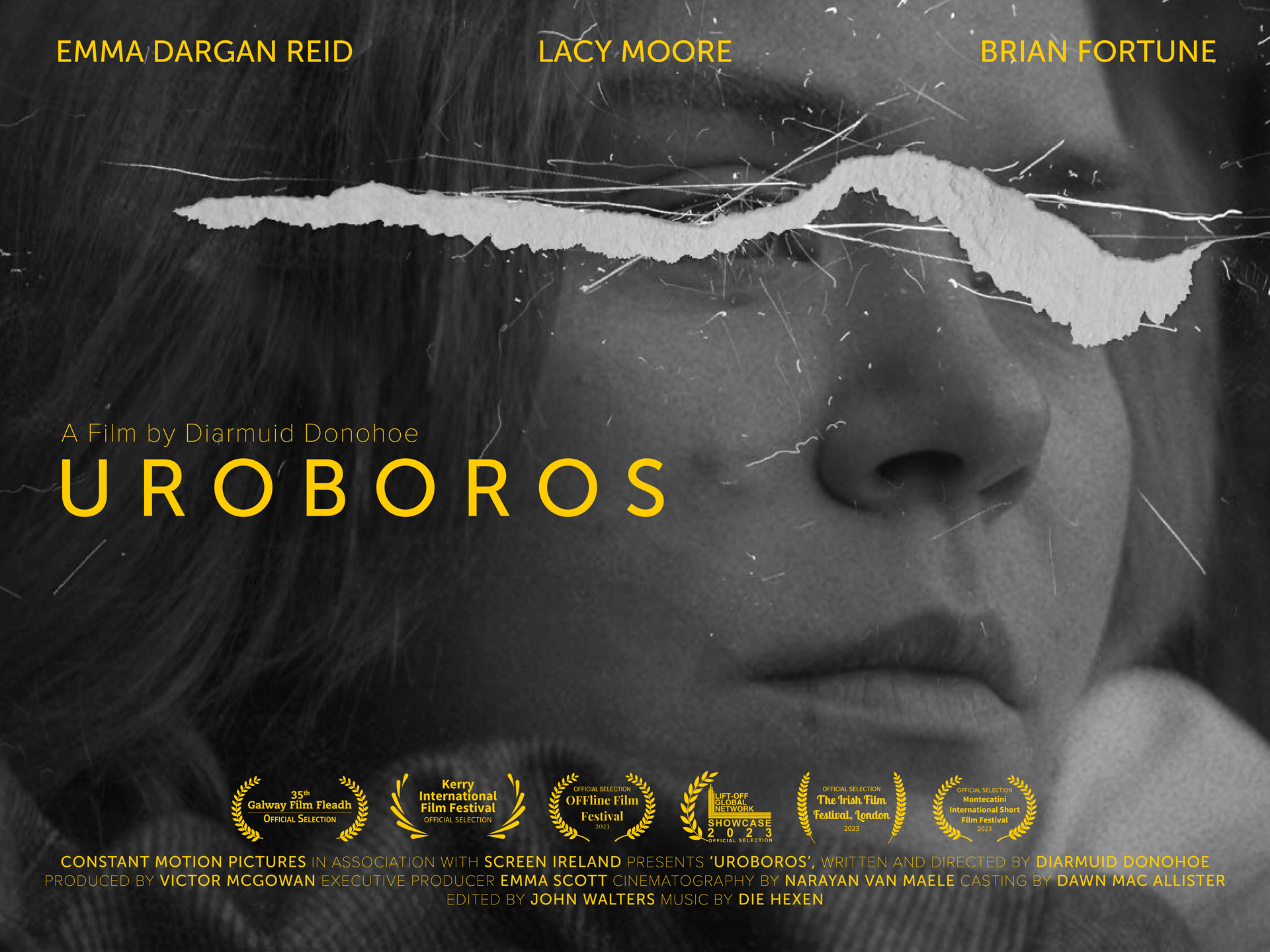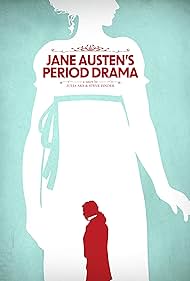
Short Film Review “Uroboros”
WATCH THE TRAILER BELOW
First, the Recap:
Signs of the times. Regardless of what era in history one looks into, older or present, it seems far too common to discover that there were drastic elements of social disharmony experienced which tended to be directed towards a certain group of people. Yet, what makes it all even more disheartening–it was seen as “needed” to maintain the status quo, and then treated as “normal” or, forbid “expected”, when anyone didn’t choose to abide by the conventions laid out. The aftermath–unnecessary hardship and torment for those targeted. It is 1950’s Ireland, and a young woman named Moira (Emma Dargan-Reid) is only trying to LIVE, vivacious and untroubled. However, there’s a shadowy specter which haunts her in the form of an abusive father (Brian Fortune) and the mentally stormy and debilitating ramifications of misplaced, merciless, and judgmental attitudes she’s been forced to unduly endure.
Next, my Mind:
History is so sadly replete with societal mistreatment of specific groups of individuals, most often based on race, creed, or gender, which somehow finds the means to be seen as “needed” or “normal”, leaving those who are victimized alone, fearful, and even more tragically, silent. In another tribute to the Emerald Isle’s incredibly revitalized presence on the international film stage (WELL deserved recognition, NO question), we have this new 10-minute short from writer/director Diarmuid Donohoe and producer Victor McGowan that utilizes its abbreviated runtime to maximum effect, forceful impact, and provocative potency in painting a portrait of emotional and mental fracturing occurring during Ireland’s past that got centered on women who were apparently deemed “too free” in the manner they were attempting to live their life by. Based on real events, this only makes the film’s messages both definitively necessary and formidably stirring. Truthfully, in how this sees women treated during this time in Ireland, it reminds me in a way of the Salem witch trials, where inexcusable non-understanding lead to such devastating persecution.
Through a format that is 99% dramatic thriller paired with 1% mild but still eerily menacing, horror-esque elements (slight tribute to “The Ring”, anyone?), the project’s narrative finds a young woman ensnared in an ever-increasingly shattered state of mental un-wellness and abject personal entropy when the foundational lifestyle and attitude she’s trying to exist through has been unceremoniously fractured by her father’s verbal and, by conjecture and hinted-at instances, physical abuse, leading to a harrowingly fractured state of being that now incessantly haunts her while having been unjustifiably committed to a mental hospital. The film’s initial atmosphere of calmness and perceived normalcy doesn’t last long here, as its frantically unflinching vision of the effects of traumatic experience and the associated compartmentalization that manifests because of it is blatantly jarring but so intelligently effective in depicting just how a human mind makes every effort to cope with it all.
What also works so well is the narrative’s employment of often quickly passing flashbacks which deftly fill in the history of events while smartly create the UN-realities and sense of overt confusion and unease being portrayed. The starkness of the imagery overall, made more somber by the black and white format utilized, becomes a character in itself, allowing for each sequence throughout the film to carry its intended influential weight and meaning while the music score also greatly enhances this as well via an unnervingly ominous tone that mirrors the building magnitudes of tension the narrative elicits. Beyond the primary premise, thematic facets of longing, love, parental division, radically misguided societal perspectives and actions taken due to it, lack of deeper understanding about mental health issues associated with trauma, dogmatic judgements about what isn’t seen as “acceptable behavior”, the yearning to just BE liberated as a person, the desperate need for real love and support all get explored, culminating in a finale that WILL jolt you, incontrovertibly resonate in your memory, and put an emphatically placed exclamation mark on all you’ve seen.
Dargan-Reid exhibits full-tilt emotional volatility that unapologetically explodes on screen with a pervasive strength that so adeptly suits the narrative’s whims through her lead role as Moira, a young woman in 1950’s Ireland who has had the terrifying indignity of being seen as “too carefree” in her life choices and general demeanor, drawing the wrath of her rigidly remorseless father who decides the best answer is to throw her into a mental facility. Now having to suffer the aftermath of the sheer amount of inner wounding her mind especially has to try and make sense of much less get through, Moira’s entire comprehension of her reality splinters severely, re-living the events that caused her plight while harboring all the resentment and anger at her parents that she does. Holding to only ONE semblance of good via a relationship she had relished and had solace in, even this gets shaken to its core in the fragmented chaos that’s now all she knows.
It’s one of those types of performances that I seriously admire when actors take it on, as to truly DIVE INTO the mindset required to convey this level of eruptive and vigorous vulnerability and disquiet is impressive, while doing it realistically without overacting the unrelenting fervency it entails, and Dargan-Reid fully, energetically, and believably portrays it all with absolute skill. Primary supporting turns are present here first from Fortune as Moira’s domineering father whose only plan when it comes to handling his “wayward” daughter is to not just expel her from their home, but rather commit her to a mental hospital as a “cure”. Unforgiving in this, even the protestations of his (supposedly) beloved wife is met with possible retribution and even violence. Lacy Moore is Moira’s equally stern but FAR more doting and genuinely concerned mother who is filled with anguish and rage when her husband makes the choice he does in regard to Moira, leading to what we now can surmise has been another situation where a woman has been subject to the ensuing and past abuse at his hands that is “keeping her in line”.
Liam Bixby is Eammon, Moira’s love interest who clearly has been (or was?) the SOLE focal point of positivity in her life, and who very plainly made sure she always knew he was there to support her in all she was experiencing. Additional appearances are made by Amy Dunne and Tara Quirke as a pair of nurses who work at the mental institution Moira gets sent to. So, in total, “Uroboros” unquestionably embodies its title, which is referencing the symbolic image of cycles of destruction followed by rebirth via a snake eating its own tail, but does so more here to illustrate the inward desolation and deconstruction of the human mind in the wake of mental depredation that WAS a pattern during the era in Ireland represented. At the bare minimum, one hopes seeing this film will candidly remind us about the kinds of unwarranted ignorance this world has brought about and that DOESN’T need to be repeated. There’s plenty that DOES need to be altered in today’s age, so let’s get to it instead of allowing the fabric of basic humanity be worn away.
STAR RATING (out of 5):
As always, this is all for your consideration and comment. Until next time, thank you for reading!





Permalink